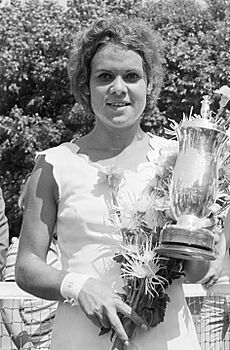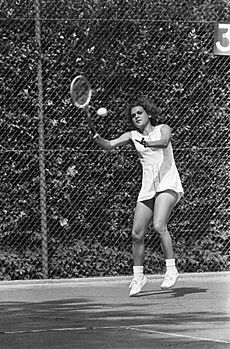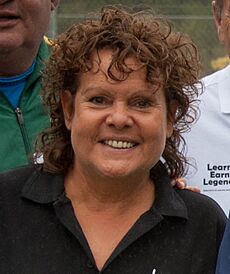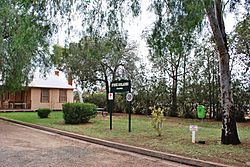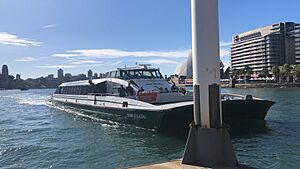Evonne Goolagong Cawley facts for kids
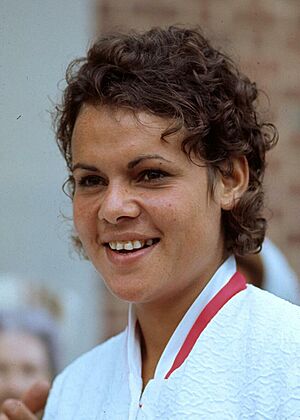
Goolagong in 1973
|
|
| Full name | Evonne Fay Goolagong Cawley |
|---|---|
| Country (sports) | |
| Born | 31 July 1951 Griffith, New South Wales, Australia |
| Height | 1.68 m (5 ft 6 in) |
| Retired | 1983 |
| Plays | Right-handed (one-handed backhand) |
| Prize money | US$ 1,399,431 |
| Int. Tennis HoF | 1988 (member page) |
| Singles | |
| Career record | 704–165 (81.01%) |
| Career titles | 86 |
| Highest ranking | No. 1 (1971, Lance Tingay) No. 1 (26 April 1976, WTA) |
| Grand Slam singles results | |
| Australian Open | W (1974, 1975, 1976, 1977Dec) |
| French Open | W (1971) |
| Wimbledon | W (1971, 1980) |
| US Open | F (1973, 1974, 1975, 1976) |
| Other tournaments | |
| Tour Finals | W (1974, 1976) |
| Doubles | |
| Career titles | 46 |
| Grand Slam doubles results | |
| Australian Open | W (1971, 1974, 1975, 1976, 1977Dec) |
| French Open | SF (1971) |
| Wimbledon | W (1974) |
| US Open | SF (1972, 1973, 1974) |
| Mixed doubles | |
| Career titles | 1 |
| Grand Slam mixed doubles results | |
| French Open | W (1972) |
| Wimbledon | F (1972) |
| Team competitions | |
| Fed Cup | W (1971, 1973, 1974) |
Evonne Fay Goolagong Cawley is a famous Australian former professional tennis player. She was born on July 31, 1951. Evonne was ranked as the world's number one female tennis player. She was one of the top players in the 1970s and early 1980s.
Goolagong won 86 singles titles during her career. This included seven major Grand Slam tournaments. She also won 46 doubles titles, including seven major doubles championships.
When she was 19, Goolagong won the French Open singles title. She also won the Australian Open doubles championship that year. In 1971, she won the women's singles tournament at Wimbledon. She won Wimbledon again in 1980. This made her the first mother to win the title in 66 years.
She played for Australia in three Fed Cup competitions. Her team won the title in 1971, 1973, and 1974. After she stopped playing professionally in 1983, Goolagong continued to be involved in tennis. She played in special invitational games and held important roles in sports.
Goolagong was named Australian of the Year in 1971. She received several honors for her achievements. She was inducted into the Sport Australia Hall of Fame in 1985. In 1988, she joined the International Tennis Hall of Fame. She also leads the Goolagong National Development Camp. This camp helps Indigenous boys and girls stay in school through tennis.
Contents
Early Life and Tennis Beginnings
Evonne is the third of eight children. Her family is Australian Aboriginal from the Wiradjuri people. Her father, Ken Goolagong, worked as a sheep shearer. Her mother, Melinda, took care of their home. Evonne was born in Griffith, New South Wales. She grew up in a small country town called Barellan.
Evonne grew up during a difficult time in Australia. Some Aboriginal children were taken from their families. Evonne remembers having to hide sometimes. Her mother would tell her to hide when a shiny car came. This was because they worried the "welfare man" might take her away.
Despite these challenges, Evonne started playing tennis in Barellan. A local resident, Bill Kurtzman, saw her watching through a fence. He invited her to come in and play. This was a kind act that changed her life.
In 1965, a tennis school owner named Vic Edwards saw Evonne play. He immediately saw how talented she was. He convinced her parents to let her move to Sydney. There, she went to Willoughby Girls High School. She lived with Edwards' family. He became her coach and manager.
Amazing Tennis Career
Overall Achievements
Evonne Goolagong won seven Grand Slam championships. This places her 12th on the list of all-time women's singles Grand Slam winners. She finished her career with 86 singles titles. She won singles and doubles titles at the Australian Open and Wimbledon. She also won singles and mixed doubles titles at the French Open. The only major she never won was the US Open. She reached 18 Grand Slam singles finals in total.
Goolagong reached four US Open singles finals in a row. This was from 1973 to 1976. However, she lost all of them. She is the only player in US Open history to lose four consecutive finals. She also made it to seven Australian Open finals in a row. She won three of those titles back-to-back.
Her career win-loss record was very impressive. She won 81% of her matches (704 wins, 165 losses). In Grand Slam singles tournaments, she won 82.1% of her matches.
Goolagong was ranked world No. 1 in women's tennis for two weeks in 1976. This was not known at the time. It was discovered in 2007, 31 years later. She was the second woman to hold the top spot.
Success in the 1970s
During the 1970s, Goolagong Cawley played in 17 Grand Slam singles finals. This was a record for any player during that time. From 1971 to 1977, she played in 21 Grand Slam events. She reached the final in almost every Grand Slam singles event she entered between 1973 and 1977.
In 1974, she won the ladies' doubles title at Wimbledon. She teamed up with Peggy Michel for this win. She also won the women's doubles title at the Australian Open five times. She won the French Open doubles once and mixed doubles once.
After winning the WTA Championships in 1976, Goolagong continued to play. She played on the WTA Tour until 1983. However, she did not play full seasons after 1976. She focused more on team tennis and exhibition events.
In 1976, she realized she was pregnant during the US Open final. She took a break from the regular tour. She returned in the summer of 1977. 1976 had been her best season. She won seven titles and became world No. 1.
After her daughter was born, Goolagong made a strong return. She won ten tournaments, including the Australian Open. Her ranking rose to No. 3 in the world. However, an ankle injury in 1978 forced her to miss the rest of that year. She returned to play in March 1979. She won four tournaments and ended the year ranked No. 4.
Playing in the 1980s
Injuries and illness affected her play in early 1980. But she made a triumphant return at Wimbledon. She won the title, beating four top 10 players. This was a unique achievement in Wimbledon history. She also beat two former Grand Slam finalists. She later withdrew from the US Open due to a back injury and early pregnancy.
Goolagong was mostly absent from the tour in 1981. She returned to play in Australia later that year. Her comeback was not always consistent. In 1982, she pushed Chris Evert to three sets. She also beat the French Open champion, Hana Mandlikova.
She played less in 1982 but won two matches in the Federation Cup. She reached her only singles final of the year in Sydney. She beat world No. 3 Andrea Jaeger there. Despite playing less, she ended 1982 ranked 17th.
In 1983, she did not reach any quarterfinals. She played her last Grand Slam singles match at the French Open. She lost in the third round. She then withdrew from Wimbledon singles. She played doubles at Wimbledon with Sue Barker. This was her last Grand Slam appearance.
She made a brief return to competitive play in 1985. She played in the Australian Indoor Championship. She lost her only match there.
Evonne Goolagong is the only mother to have won the Wimbledon title since Dorothea Lambert Chambers in 1914. She married Roger Cawley in 1975. Their daughter was born in 1977.
Life After Professional Tennis
Even during her playing days, Goolagong promoted many products. She appeared in TV and print commercials. After she retired, she continued these endorsements. She promoted her own sports clothing brand, 'Go Goolagong'.
In 1988, she was inducted into the International Tennis Hall of Fame. In 1990, Goolagong started playing in senior invitational competitions. She returned to Wimbledon for the first ladies senior invitational doubles.
Goolagong worked as a touring professional in South Carolina. Later, she returned to Australia.
From 1995 to 1997, Goolagong was on the Board of the Australian Sports Commission. Since 1997, she has been a Sports Ambassador. She works with Aboriginal and Torres Strait Islander Communities. She was also captain of the Australian Fed Cup team in 2002. In 2003, she won an award from the International Olympic Committee. This award recognized her work for women and sports.
She also runs an annual "Goolagong National Development Camp." This camp helps Aboriginal children stay in school. It encourages them through playing competitive tennis. In October 2023, Goolagong supported the "Yes" vote in the Indigenous Voice referendum.
Awards and Special Recognition
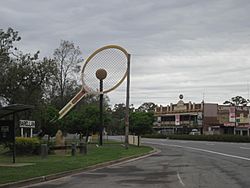
Goolagong was named Australian of the Year in 1971. She received the Member of the Order of the British Empire honor in 1972. In 1982, she was made an Officer of the Order of Australia. She was inducted into the Sport Australia Hall of Fame in 1985. In 1988, she joined the International Tennis Hall of Fame. In 2018, she received the Companion of the Order of Australia. This was for her great service to tennis and for helping young Indigenous people.
In 1972, she played in a tournament in South Africa. At that time, there was apartheid, a system of racial separation. To protect her from discrimination, the authorities called her an "honorary white."
She received the WTA Sportsmanship Award in 1978 and 1980. The Evonne Goolagong Cawley Trophy is named after her. This trophy is given to the female champion at the Brisbane International tennis tournament.
In 1993, a RiverCat ferry in Sydney was named after her. This ferry travels daily from Parramatta to Circular Quay.
The National Museum of Australia has a collection of her memorabilia. This includes her Wimbledon trophies from 1971 and 1980. It also has a trophy from her 1974 doubles win. The collection includes racquets she used and a special dress.
In 2001, Goolagong was added to the Victorian Honour Roll of Women. This was for her achievements as a tennis player.
A giant replica of a tennis racquet used by Goolagong is in Barellan. It is 13.8 metres (45 ft) long. Goolagong herself unveiled this large model in 2009.
In 2016, Australia Post honored Goolagong and ten other Australian tennis players. They appeared on a postage stamp set. In April 2016, she received an honorary doctorate from the University of South Australia. This recognized her service to the community.
In June 2018, the International Tennis Federation (ITF) gave her its highest award. This was the Philippe Chatrier Award for her contributions to tennis. Evonne Goolagong is widely considered one of the greatest women's tennis players ever.
Personal Life
When Vic Edwards became her coach, Evonne Goolagong lived with his family. He became her legal guardian. Evonne later married Roger Cawley on June 19, 1975. After her marriage, she moved to Naples, Florida. Roger Cawley became her coach and manager.
Evonne's father, Ken, passed away in a car crash in 1974. Her mother, Melinda, passed away in 1991. After her mother's funeral, Evonne and Roger bought a home in Noosa Heads, Queensland. They settled there with their two children, who were born in the United States. Their daughter, Kelly (born 1977), helps run her tennis camps. Their son, Morgan Kiema Cawley (born 1981), played soccer professionally. Evonne Goolagong is also the great-aunt of National Rugby League player Latrell Mitchell.
Evonne's brother, Ian, was an amateur tennis player. He played mixed doubles with Evonne at Wimbledon in 1982. As of 2015, Ian Goolagong was the president and coach at the Lalor Tennis Club in Victoria.
Autobiography
Goolagong Cawley, Evonne; Jarrett, Phil (1993). Home! The Evonne Goolagong Story. Simon & Schuster. ISBN 0731803817.
Career Statistics Highlights
Grand Slam Singles Finals: 18 (7 Wins, 11 Losses)
| Result | Year | Championship | Surface | Opponent | Score |
|---|---|---|---|---|---|
| Loss | 1971 | Australian Open | Grass | 6–2, 6–7(0–7), 5–7 | |
| Win | 1971 | French Open | Clay | 6–3, 7–5 | |
| Win | 1971 | Wimbledon | Grass | 6–4, 6–1 | |
| Loss | 1972 | Australian Open | Grass | 4–6, 4–6 | |
| Loss | 1972 | French Open | Clay | 3–6, 3–6 | |
| Loss | 1972 | Wimbledon | Grass | 3–6, 3–6 | |
| Loss | 1973 | Australian Open | Grass | 4–6, 5–7 | |
| Loss | 1973 | US Open | Grass | 6–7(2–7), 7–5, 2–6 | |
| Win | 1974 | Australian Open | Grass | 7–6(7–5), 4–6, 6–0 | |
| Loss | 1974 | US Open | Grass | 6–3, 3–6, 5–7 | |
| Win | 1975 | Australian Open (2) | Grass | 6–3, 6–2 | |
| Loss | 1975 | Wimbledon | Grass | 0–6, 1–6 | |
| Loss | 1975 | US Open | Clay | 7–5, 4–6, 2–6 | |
| Win | 1976 | Australian Open (3) | Grass | 6–2, 6–2 | |
| Loss | 1976 | Wimbledon | Grass | 3–6, 6–4, 6–8 | |
| Loss | 1976 | US Open | Clay | 3–6, 0–6 | |
| Win | 1977 | Australian Open(Dec) (4) | Grass | 6–3, 6–0 | |
| Win | 1980 | Wimbledon (2) | Grass | 6–1, 7–6(7–4) |
Grand Slam Doubles Finals: 7 (6 Wins, 1 Loss)
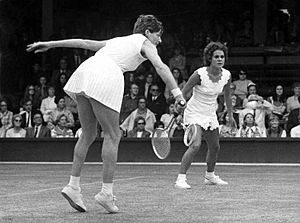
| Result | Year | Championship | Surface | Partner | Opponents | Score |
|---|---|---|---|---|---|---|
| Win | 1971 | Australian Open | Grass | 6–0, 6–0 | ||
| Loss | 1971 | Wimbledon | Grass | 3–6, 2–6 | ||
| Win | 1974 | Australian Open (2) | Grass | 7–5 6–3 | ||
| Win | 1974 | Wimbledon | Grass | 2–6, 6–4, 6–3 | ||
| Win | 1975 | Australian Open (3) | Grass | 7–6, 7–6 | ||
| Win | 1976 | Australian Open (4) | Grass | 8–1 | ||
| Win | 1977 | Australian Open [Dec.] (5) | Grass | Shared - rained out |
Note: The shared women's doubles title at the Australian Open in 1977 (December) is not always counted. This is because the finals were never played due to rain.
Grand Slam Mixed Doubles Finals: 2 (1 Win, 1 Loss)
| Result | Year | Championship | Surface | Partner | Opponents | Score |
|---|---|---|---|---|---|---|
| Win | 1972 | French Open | Clay | 6–2, 6–4 | ||
| Loss | 1972 | Wimbledon | Grass | 4–6, 4–6 |
Tennis Records
- These records were achieved during the Open Era of tennis.
- Records in bold mean she is the only player to achieve them.
| Championship | Years | Record accomplished | Player tied |
| Australian Open | 1971–1976 | 6 consecutive finals | Martina Hingis |
| Australian Open | 1975–1977 | 3 wins without losing a set | Steffi Graf |
| Australian Open | 1974–1976 | 3 consecutive titles | Margaret Court Steffi Graf Monica Seles Martina Hingis |
| French Open | 1971 | Won title on the first attempt | Stands alone |
| Wimbledon | 1980 | Won Wimbledon as a mother | Dorothea Lambert Chambers |
| Wimbledon | 1980 | Only singles champion to defeat four top ten seeds (Mandlikova #9, Turnbull #6, Austin #2, Evert-Lloyd #3) | Stands alone |
| US Open | 1973–1976 | 4 consecutive runner-ups | Stands alone |
See also
 In Spanish: Evonne Goolagong Cawley para niños
In Spanish: Evonne Goolagong Cawley para niños
- List of female tennis players
- Tennis performance timeline comparisons
 | Tommie Smith |
 | Simone Manuel |
 | Shani Davis |
 | Simone Biles |
 | Alice Coachman |


